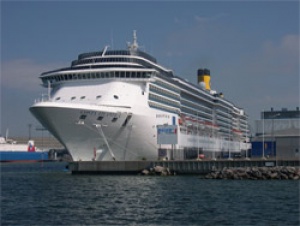Southampton docks may build generator for ships to cut carbon emissions

CRUISE liners docking in Southampton could be plugged into an onshore power supply to stop harmful emissions being blown into the city.
Port bosses ABP and cruise giants Carnival UK yesterday said they were considering introducing the low-carbon technology, known as cold ironing, in Southampton.
It would make the port one of the greenest in the country and comes after a report last year warned that chemicals within smoke from liners, tankers and cargo ships could travel into the lungs of those onshore.
The scheme is outlined in the draft Port of Southampton Masterplan 2009, which sets out ABP’s vision for the docks for the next two decades.
It’s most likely the costly technology would only be retrofitted in the short-term at the city’s cruise terminals as many modern liners are already at the cutting edge of sustainable technology.
ADVERTISEMENT
If implemented, liners would be made to switch off their generators while berthed.
Shore-side generators would then power the vessel’s refrigeration, cooling, heating, lighting and emergency equipment as it loads or unloads.
As an added incentive, the electricity could come from the city’s Energy Centre, which has supplied more than half of the port’s power for the past six months.
ABP commercial manager Ian Palacio said the only way cold ironing could succeed would be if the major cruiseliners partnered with the port to make it happen.
“We don’t want to force anyone into it, but we always want to be ready for that opportunity,”
Mr Palacio said.
The Daily Echo understands high-level discussions have been held between ABP and Carnival UK about the viability of cold ironing.
In a statement, a Carnival UK spokesman said: “Carnival UK as an environmentally aware company would be willing to work with any port in developing projects which were both commercially viable and environmentally friendly.”
Southampton City Council highlighted the potential for shore-side electricity in its Air Quality Action Plan.
The report found shipping contributes up to a quarter of nitrogen dioxide in the Town Quay area and 17 per cent in Commercial Road.
Ports in the United States, Canada and Germany have already invested millions in the technology to help improve air quality in coastal cities.
Scientists from the University of California last year estimated as many as 60,000 deaths a year worldwide were caused by emissions from ships running on cheap fuel called bunker oil.
There are no restrictions on the types of fuel vessels consume in UK ports, however the International Maritime Organisation is considering introducing new requirements to use cleaner, more expensive fuels. But they’ve been held up by disagreement between developed and developing countries about who should participate.

